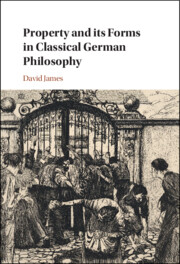Book contents
- Property and Its Forms in Classical German Philosophy
- Property and Its Forms in Classical German Philosophy
- Copyright page
- Contents
- Acknowledgements
- Abbreviations
- Introduction
- Chapter 1 Property, Freedom and Enlightenment
- Chapter 2 Fichte on Property and Labour
- Chapter 3 Property and Ethical Life
- Chapter 4 Equality, Exchange Value and Individuality
- Concluding Remark
- Bibliography
- Index
Chapter 3 - Property and Ethical Life
Hegel’s System of Right
Published online by Cambridge University Press: 22 December 2022
- Property and Its Forms in Classical German Philosophy
- Property and Its Forms in Classical German Philosophy
- Copyright page
- Contents
- Acknowledgements
- Abbreviations
- Introduction
- Chapter 1 Property, Freedom and Enlightenment
- Chapter 2 Fichte on Property and Labour
- Chapter 3 Property and Ethical Life
- Chapter 4 Equality, Exchange Value and Individuality
- Concluding Remark
- Bibliography
- Index
Summary
I begin with an account of the fundamental aims of Hegel’s ‘science of right’ so as to show how his account of property faces two key challenges: justifying the concept of property and any specific form of it, on the one hand, and integrating property into the system of right, which includes subordinating it to any higher moments of right, on the other. I then turn to Hegel’s argument for private property. I distinguish between two interpretations of his argument: the ‘embodiment’ interpretation and the ‘recognition’ interpretation. I identify serious problems with the first interpretation and then argue for a version of the second one that entails the type of triadic model of the concept of property developed by Fichte and already implicit in Kant’s Rechtslehre. I show that this triadic model, and thus Hegel’s full argument for private property, becomes explicit only at the stage of contract. Next, I discuss how Hegel seeks to integrate private property into ethical life, and I argue that the idea of ethical life is, in fact, more compatible with some form of common or collective property because this form of property is more expressive of this idea.
- Type
- Chapter
- Information
- Property and its Forms in Classical German Philosophy , pp. 89 - 138Publisher: Cambridge University PressPrint publication year: 2023



